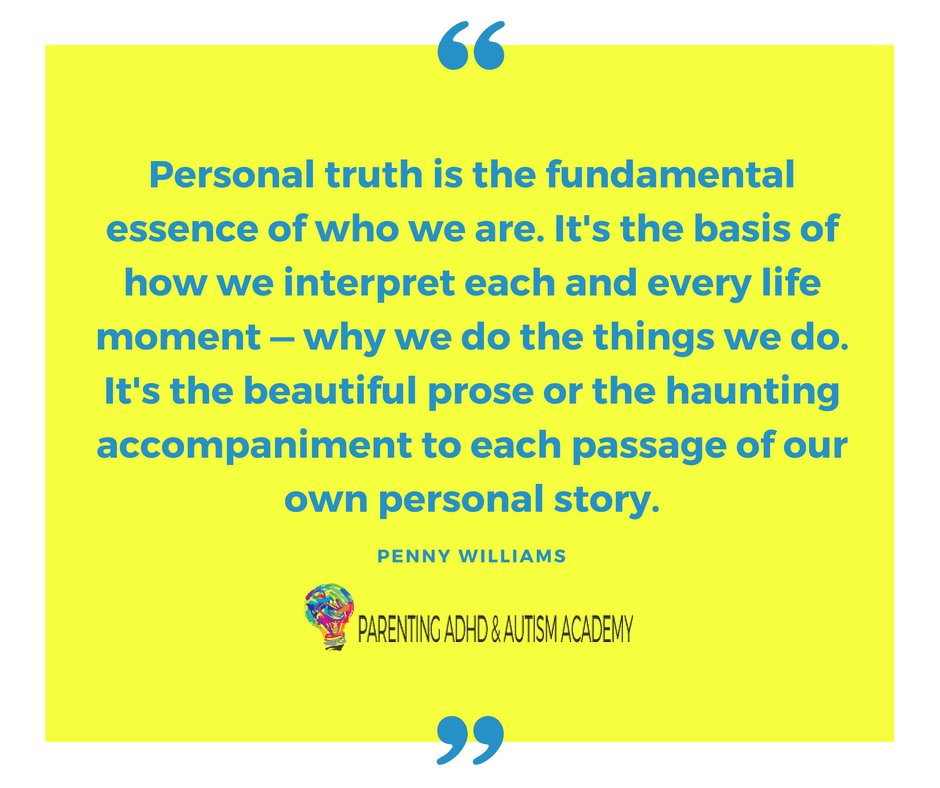The Power of Your Child’s Personal Truth
The Power of Your Child’s Personal Truth

What is personal truth?
Personal truth is our individual code, formulated by the culmination of genetics, environment, education, and relationships. There’s so much that goes into making each of us precisely who we are. The characteristics we inherit from our mother and father through genetics. The characteristics we get through genetic abnormalities and derivatives. The culture of and experiences within our environment play a profound role in defining who we are (for instance, a good education boosts opportunities, while a subpar education holds many back from true achievement). Relationships often shape what we think of ourselves, how we see ourselves.
Our personal truth is completely unique to us. No two truths are ever alike. Even identical twins have vastly different personal truths.
Our personal truth is the story of collaboration created by our own heart, mind, and soul. It can be a beautiful, intelligent story, a troubled dark story, a simple warm story, or so many unique facets in between. Our personal truth is the root of everything. Life grows, branches, and meanders from it. Sometimes it produces beautiful flowers and fruit, sometimes it dances in the wind, and sometimes it withers and breaks.
This personal truth is the fundamental essence of who we are. It’s the basis of how we interpret each and every life moment — why we do the things we do. It’s the beautiful prose or the haunting accompaniment to each passage of our own personal story.
As if it isn’t hard enough to figure out who we are growing up, we are ever-changing — physically, mentally, and emotionally. There’s ebb and flow to one’s personal truth.
The role of ADHD and/or autism in personal truth
Our strengths and weaknesses play a big part in forming who we are, too. We like positive experiences and try to create more of them, and we inherently avoid what is a struggle, what is painful. ADHD and/or autism plays an enormous role in defining your child’s personal truth. It’s crucial to acknowledge that.
As parents, we fall into the trap of trying to define our child’s truth through our own perspectives and expectations. This fails our kids. Instead of imposing our own truth, a parent’s job is to simply be your child’s guide through the journey of discovering and defining his own personal truth. It’s our duty to acknowledge and support his truth, not help him realize your vision for him.
How to discover, accept, and listen to your child’s personal truth
If there’s one overarching lesson from the last 8+ years of navigating this special brand of parenthood with my own son, it’s that his personal truth is his compass, and I cannot change that truth. His unique strengths and weaknesses play a key role in defining his truth. His different experience in the world helps to shape his truth. I’m doing my best for him when I honor his personal truth in my parenting.
I’ve spent a lot of time trying to understand ADHD and autism and how they affect my son specifically. I didn’t know it at the time, but that was an effort to discover his truth. Now I focus my efforts on really listening to and accepting his truth — what’s true for him at any given moment. I let his truth guide my parenting compass.
This is the illustration of this concept I provide in The Insider’s Guide to ADHD, and it’s a great example of recognizing and acknowledging your own child’s truth:
 “Your child may not be telling you the facts of the situation all the time — i.e., lying — but this is not a character flaw or a measure of morality and ethics. When kids with ADHD embellish the truth or tell stories, they are telling you how they interpreted an event or how it felt to them — they are telling their truth. That is a vital perspective for parents. Don’t dismiss what they are saying just because you know it’s not one hundred percent factual. Recognize that what they are saying has hidden truth to it — the truth about how they felt.
“Your child may not be telling you the facts of the situation all the time — i.e., lying — but this is not a character flaw or a measure of morality and ethics. When kids with ADHD embellish the truth or tell stories, they are telling you how they interpreted an event or how it felt to them — they are telling their truth. That is a vital perspective for parents. Don’t dismiss what they are saying just because you know it’s not one hundred percent factual. Recognize that what they are saying has hidden truth to it — the truth about how they felt.
When your son flings open the door with great gusto, marches in from school in the afternoon, and tells you that a classmate ‘almost killed him’ on the playground today, don’t interrupt and don’t dismiss him. Listen and acknowledge how that felt to him. ‘That must have really frightened you, Buddy. I’m sorry that happened.’ While he wasn’t likely almost killed on the playground in a literal sense, that’s how it felt through his unique and hypersensitive perspective. Saying that a classmate almost killed him on the playground today is his truth.”
Another way of letting your child’s personal truth be your parenting guide is through understanding your child’s developmental age. Kids with developmental disabilities, like ADHD and autism, are usually 2-3 years behind their peers developmentally. That means, if you have a 12 year old with ADHD and/or autism, you’re actually parenting a 9-10 year old. His developmental age is part of his personal truth, and, as such, should be your guide to rewards and punishment, discipline, expectations, and empathy and validation.
The truth can set your child free
Accepting your child’s personal truth has a big effect on his day-to-day life experience, and on his self-esteem. If you always ask him to meet expectations that are beyond his capability, he will feel incapable and misunderstood. Those feelings lead to sadness, anxiety, anger, outbursts, and other unwanted behaviors.
In contrast, when you accept a child’s personal truth — when you acknowledge where he is in terms of development, capability, and perspective — you support him, show unconditional love, and boost self-esteem. This empowers you to maintain a positive mindset, and positive thinking is very powerful.
The truth can set parents free
Imagine truly understanding your child. Understanding why he’s more emotional than his peers. Understanding the interests that fuel his motivation. Understanding the depth of stress he experiences. Understanding the magnitude of his struggle. Understanding where he finds joy. Understanding his personal truth.
Imagine how that can change your lives, and your family. It can reduce conflict, boost confidence, create more opportunities for joy, and offer some peace. Your child’s truth and your consideration and acceptance of his personal truth are monumentally powerful.



